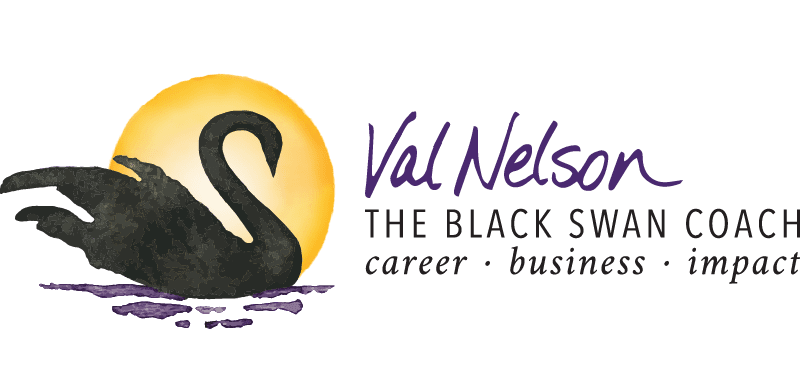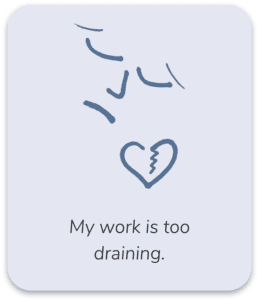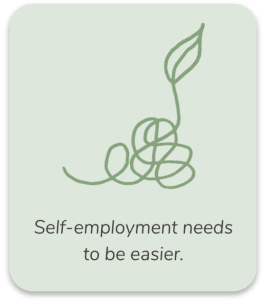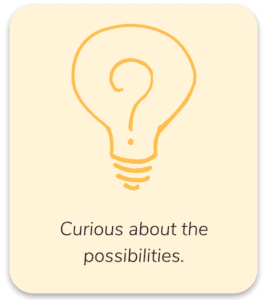Dear Val:
“I hear informational interviews are important so I can explore career and business ideas, but how does that work? Huh? What? Who do I ask? What questions do I ask? They’ll think I’m weird…”
~from almost every introvert I talk to (at first)
Asking people questions about their career or business path is such a helpful step in finding your own path. And yet, the concept of informational interviews seems awkward, at first, for many introverts.
Informational interviews are good for when you’re exploring career ideas, business ideas, new niche ideas for your business, retirement ideas, and more. There’s so much gold in there.
I hate seeing so many people get stuck on this step. Let’s make this simple, right here and now.
There are particular concerns that I notice introverts raise about informational interviews. Do you recognize these?
- Won’t I be bothering the person if I ask them to speak with me?
- How can I find people to interview?
- I can’t just cold call some stranger I found online!
- I don’t know what to ask. I’ll be tongue-tied.
- I don’t know enough about the field to ask good questions. I’ll sound stupid.
- I don’t know what I’m planning to do yet, so I’ll seem unfocused.
- Is it a call, a lunch invitation, what? What’s the etiquette?
First I’ll give my short answer to each of those classic concerns, then I’ll elaborate and give you some basic steps including what to ask.

My Answers to Common Concerns about Informational Interviews
- Won’t I be bothering the person if I ask them to speak with me?
No. They’ll probably love it! The most helpful people to interview actually like sharing what they know. Trust that they won’t say yes unless they want to do it. (It’s OK to hear a “no” or lack of response. Move on.) - Who to ask? How can I find people for an informational interview?
Ask someone who loves to connect people if they know someone in the field you’re exploring. Search your LinkedIn connections and find a connection to them from there. - I can’t just cold call some stranger I found online!
I don’t think cold calling will be necessary. You’ll find people to introduce you and then it’s a warm call. See #2 above. (If you’re still stumped about who, I’ll answer that below.) - What to ask? I’ll be tongue-tied.
I’ll give you some questions below. - I don’t know enough about the field to ask good questions. I’ll sound stupid.
You’re asking because you don’t know. That’s normal. Your role is about asking questions — not proving your knowledge. I’ll give you some questions below. - I don’t know what I’m planning to do yet so I’ll seem unfocused.
See #5 above. - Is it a call, lunch, what? What’s the etiquette?
Make it a simple specific request such as for “a 20-minute call to ask a few questions.” It’s easy to say yes to that. If they want to offer more, roll with it. If there are refreshments involved, you pay for both of you.
What an Informational Interview Is and Is Not
It’s NOT: a job interview; a request for a job; a sales pitch; a time to promote yourself; an awkward conversation between total strangers.
It IS: a time to learn about their line of work or their workplace; a friendly conversation between people with common interests; an opportunity to build your network of kindred spirits.
Hint for introverts: Introverts tend to be naturally drawn to and good at meaningful one-on-one conversations. This is where you shine. You’ve got what it takes.
What To Ask
Here’s a list that works for learning about a line of work. It’s likely you won’t get to ask all of them but you might still learn answers to all of them as they talk. At least use some version of the first and last questions:
- I’d love to hear about what you do. Can you tell me a little about it, such as a typical day?
- What do you enjoy most about it?
- What do you find challenging about it?
- What do you think someone considering the field should know?
- What kind of strengths or experience do you think would be a great fit for your field?
- Anything else you want me to know?
If you’re interviewing them because you’re interested in their particular workplace, adjust the questions as needed. I think you get the idea.
Etiquette Tips for Informational Interviews
- When you ask for the call, don’t say “Can I pick your brain?” Ugh, that makes me want to run the other way when it’s phrased that way. It sounds like taking. You’re about connecting.
- Be specific with your request, such as “I’m exploring the field of _____, and I wonder if you’d be willing to answer some questions for me about it in a short phone call, which I imagine would be less than 20 minutes.”
- In your request, offer them some time options so they don’t have to think so much. For instance: “Weekdays between 10am-1pm work for me. Is there something in there in the next two weeks that might work for you?”
- Always send a “thank you” note of some kind. In the mail is great, especially if they went above and beyond. At least via email.
- Your “thank you” note should be specific about what you found helpful. Let them know that that time meant something to you.
- Yes you can go back for more questions, assuming you felt their genuine desire to help.
- If you had a nice connection, they will likely want to hear what happens. Save their info and loop back with updates on what you decided or if you’re starting something new.
What To Do with What You Learn
Let’s say you’ve just done an informational interview. What do you do with what you learned? How do you keep track of all this?
I encourage you to take notes during the call, and then take time right afterwards to reflect on it with some questions for yourself like these:
- What parts drew me in?
- Where did I find myself pulling back in disinterest?
- What am I now more curious about? Is there a next question to explore?
- What insights are coming to me?
- What are some next steps I might want to set as intentions?
Be sure to mark your notes with the names, contact info, date of the call, and their field and position, so you know the context. If you like spreadsheets, I recommend that. Save their info somewhere for potential followup.
Staying in Touch with Some Interviewees
Especially if you had a nice connection, they will want to hear what happens, and you’ll probably benefit from the widened network.
Therefore, be sure to save them in your contacts and tag them in some way that makes them easily searchable when the right time comes.
One of my favorite ways to “save” people is to connect right away on LinkedIn (always with a personalized note in the invitation to connect). Then I can always search in LinkedIn even if I remember what they do but not their name.
“Really, I don’t know who to ask.”
In the questions at the outset, I talked about how to find who to ask. If you’re still stumped, here’s some homework for you. Bear with me and try it:
Step 1: Make a list of 50 people who would recognize you by name. Look in your email contacts, your LinkedIn contacts, your Facebook friends, and even your family. It all counts. You know more people than you think.
Step 2: You can now go through that list and see if you’re willing (or kinda willing) to ask these people who they know in your field. Don’t dismiss anyone too quickly. Aunt Sally really might know someone. You really can ask for help on this. People like to help.
Alright, you found at least one person to ask? Go ask. One is a good start. (It will build courage for asking the second person.) I know you know at least one person.
Feeling More Ready?
Sometimes it’s just about getting started. If you’re like most people, it’s the first one that feels hard and then you’ll be saying to me, “That was actually fun! Who knew?”
Now that you’ve got your cheat sheet, even the first one might be pretty easy. Ready to go? I’m with you in spirit. I’d love to hear what happens.
Questions/Comments?
Feel free to post a question or comment below and I’ll answer.





